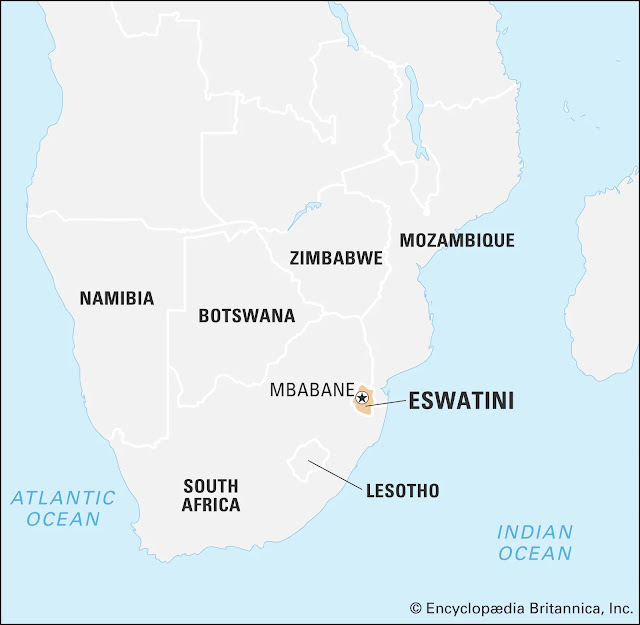Eswatini, formerly known as Swaziland, is a small, landlocked country in Southern Africa. It has a rich history shaped by Bantu migrations, the rise of the Swazi Kingdom, British colonization, and post-independence challenges. Today, Eswatini remains one of the last absolute monarchies in the world.
Early History and Bantu Migrations (Pre-15th Century)
The earliest inhabitants of Eswatini were San (Bushmen) hunter-gatherers, who left behind rock paintings found in various parts of the country.
Around 1000 CE, Bantu-speaking groups, including the Nguni and Sotho-Tswana peoples, migrated into the region.
By the 15th century, these groups introduced ironworking, agriculture, and livestock herding, gradually displacing the San.
The Rise of the Swazi Kingdom (18th–19th Century)
Formation of the Swazi State
The Swazi people, part of the Nguni ethnic group, originally lived in present-day Mozambique.
Under King Ngwane III (c. 1745–1780), they migrated westward into present-day Eswatini, escaping Zulu expansion.
He is considered the first King (Ngwenyama) of the Swazi nation.
King Sobhuza I and Nation-Building
King Sobhuza I (1815–1836) expanded Swazi territory and defended the kingdom against the powerful Zulu Kingdom, led by Shaka Zulu.
Sobhuza also united different clans, strengthening the Swazi identity.
King Mswati II and the Golden Age (1840–1865)
King Mswati II, who ruled from 1840 to 1865, is considered the greatest Swazi king.
He expanded the kingdom’s borders to include parts of modern Mozambique and South Africa.
Under his leadership, the Swazi people resisted both Zulu attacks and European encroachment.
The country was named Eswatini ("Land of the Swazis") in his honor.
Colonial Era and British Rule (1881–1968)
European Encroachment and Boer Involvement
By the late 19th century, European interest in Eswatini’s fertile land and minerals grew.
The Boers (Dutch-descended settlers) from Transvaal signed treaties with Swazi rulers, gaining land and trading rights.
Britain, fearing Boer dominance in the region, declared Eswatini a British protectorate in 1902.
British Administration (1902–1968)
The British ruled indirectly, allowing the Swazi monarchy to retain some authority over local affairs.
However, much of Eswatini’s land was taken by European settlers, leaving many Swazis as tenant farmers.
Despite colonial rule, the Swazi royal family remained influential, and traditional governance structures survived.
Path to Independence (1950s–1968)
After World War II, anti-colonial movements spread across Africa, including Eswatini.
King Sobhuza II, who ruled from 1921 to 1982, played a key role in negotiating independence.
In 1964, the British allowed limited self-government, with a Swazi National Council.
On September 6, 1968, Eswatini gained full independence from Britain, with King Sobhuza II as head of state.
Post-Independence Era (1968–1986)
King Sobhuza II’s Rule (1968–1982)
After independence, Eswatini remained a monarchy, with King Sobhuza II holding significant power.
In 1973, he dissolved parliament and banned political parties, making Eswatini an absolute monarchy.
His rule focused on:
Economic growth, supported by mining and agriculture.
Preserving Swazi traditions, including the Umhlanga Reed Dance and Incwala ceremony.
Sobhuza ruled for 82 years, making him one of the longest-reigning monarchs in history.
Succession Crisis and King Mswati III (1986–Present)
After Sobhuza II’s death in 1982, a four-year power struggle followed.
In 1986, Mswati III, Sobhuza’s son, became king at age 18.
Challenges Under King Mswati III (1986–Present)
Economic and Social Issues
Eswatini’s economy relies on sugar, agriculture, and textiles, but unemployment and poverty remain high.
HIV/AIDS is a major crisis, with one of the highest infection rates in the world (over 25%).
Corruption and lavish spending by the royal family have caused public unrest.
Democratic Movements and Protests
Pro-democracy groups demand constitutional reforms, but the monarchy resists change.
In 2021, large-scale protests erupted, demanding political reform and an end to absolute rule.
Security forces cracked down on protesters, killing dozens and arresting activists.
Eswatini’s Future: Challenges and Opportunities
Challenges
Political Reform – The lack of democracy and suppression of opposition groups remain major concerns.
Economic Struggles – Dependence on South Africa and slow economic growth hinder progress.
Social Issues – High rates of HIV/AIDS, poverty, and unemployment continue to affect the country.
Opportunities
Tourism Potential – Eswatini’s natural parks, cultural heritage, and festivals attract visitors.
Youth Activism – Young people are increasingly demanding political change and modernization.
Regional Integration – Stronger ties with South Africa and SADC could improve trade and investment.
Conclusion
Eswatini’s history reflects a journey from ancient civilizations to monarchy, colonial rule, and independence. While it has maintained political stability, it remains one of the few absolute monarchies in the world, facing economic, social, and political challenges. Whether Eswatini embraces democratic reforms or maintains traditional governance will determine its future trajectory.
Kindly share this post if you find value in it. Thanks for your support.
You can Watch this program on YouTube
P.S. In case you want to, feel free to reach out to me. If you need advice on your plans and ideas, and how to manage your time and resources, drop me a message here or email me at sopiensofgod@gmail.com, and we’ll arrange a call.
Read Next: Are You Clear About What You Want This Year?
Will you like to write a book – share your story, ideas or knowledge in a book, now it’s easier than ever. In 3 weeks, your book will be written and published. Send a message to: bookminds247@gmail.com.
Get books on Amazon: Amazon Books
Check out our website: Wordflixx Publishers
If you want customized songs for you or your loved ones' birthday, wedding, or any ceremony, Iseay music got you. Contact @ sopiensofgod@gmail.com
You can also check out these posts:
1. Making 2025 Your Best Year Yet
2. What to Do When You Are Confused
Kindly drop your comments here:







No comments:
Post a Comment